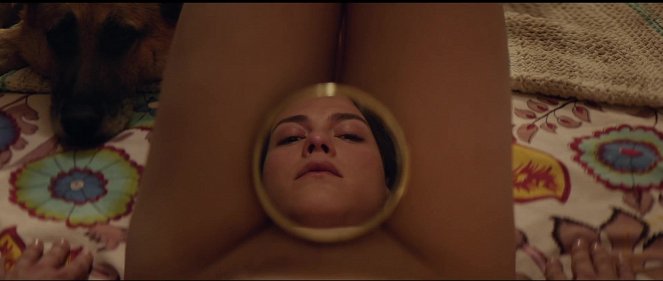Ohjaus:
Sebastián LelioKuvaus:
Benjamín EchazarretaSävellys:
Matthew HerbertNäyttelijät:
Daniela Vega, Aline Küppenheim, Amparo Noguera, Francisco Reyes, Luis Gnecco, Antonia Zegers, Néstor Cantillana, Alejandro Goic, Nicolás Saavedra (lisää)Suoratoistopalvelut (2)
Juonikuvaukset(1)
Rakastuneet Marina ja Orlando suunnittelevat tulevaisuutta. Tarjoilijana työskentelevä nuori Marina haaveilee laulajan urasta, kun taas häntä kaksi vuosikymmentä vanhempi Orlando omistaa painotalon. Eräänä iltana, Marinan syntymäpäiväjuhlien jälkeen, Orlando tuupertuu sairauskohtaukseen. Marina vie miehen ensiapuun, mutta mitään ei ole tehtävissä. Tästä alkaa Marinan painajainen. Surun murtama nainen kaipaisi tukea, mutta lohduttamisen sijasta niin lääkärit kuin Orlandon aikaisempi perhe asettavat Marinan epäilyksen alaiseksi. Marinan surua, tai hänen transnaisen identiteettiään, ei kunnioita kukaan. Orlandon edellisellä perheellä on kiire pyyhkiä Marinan mittainen luku edesmenneen miehen elämästä pois. Marina joutuu taistelemaan oikeudestaan suruun ja olemassaoloonsa, oikeudestaan olla kuka hän on: kompleksinen, vahva, suorasukainen – fantastinen nainen. (Atlantic Film Fin.)
(lisää)Videot (4)
Arvostelut (3)
A Fantastic Woman is a fragile, you could almost say introverted, film about saying goodbye to a loved one. In this case, the story is made even more painfully powerful by the impossibility of a dignified parting and the realization that finding a person that one could similarly love would be almost impossible. As is customary with South American art films, there is no milking of the viewer’s emotions; everything is intellectually subtle. For example, the use of the symphonic music score is sparing, minimalist, without clear melodic motifs.
()
A Fantastic Woman begins where most melodramas end – with the death of one of the partners. For Marina, Orlando’s death initiates a multi-phase process of defending her own identity. In front of the doctor, the police investigator, and members of Orlando’s family, she must defend everything that shapes her self – her name, her body, her voice. Almost no one is interested in what Marina wants. No one asks how she feels. Others see her not as an equal, but as an anomaly, a threat to the status quo. Each of the characters who judge Marina also represents a certain institution, by means of the which the story of one farewell takes on a political dimension. Marina is not defending only her right to live a full life. She represents everyone who doesn’t seem sufficiently normal to people like Orlando's ex-wife. ___ Lelio bases the narrative more on parallels and variations than on a causal chain of events and plot twists. We perceive Marina’s nudity during her lovemaking with Orlando differently than during the compiling of police documentation or the sauna scene. When she embraces an unknown man in a nightclub, the moment lacks the warmth of her earlier dance with Orlando shot with by a similar camera approach. The protagonist’s search for a strong voice is motivated not only by her desire for equality, but also by her dream of a singing career. Lelio’s directorial skill is perhaps even more evident in the natural blending of the individual and emancipatory stories than in the scenes where he abandons the dominant realistic style and allows the protagonist at least an imaginary escape into a world where she can be herself. ___ A Fantastic Woman is one of those films in which every shot excels by being well thought out. The colours, the framing and the objects in the mise-en-scène bear meanings and provide commentary on the life situation in which the characters find themselves. For example, Marina wears a necklace in the shape of a semicircle through most of the film. When she realises that she cannot base her identity on the absence or presence of a compatible other half, she replaces the half-circle with a key. It’s not the most subtle metaphor for finding the key to one’s soul, but Lelio isn’t going for subtlety. Like the main female character, his bold film, precise in its details and uplifting in the end, does not conceal anything and is not afraid to meet the audience halfway. At the same time, it doesn’t pander or beg for sympathy. Furthermore, it doesn’t force you to accept Marina in all her diversity. The final realisation that you would have liked to spend a lot more time with this fantastic woman is thus all the more valuable. 90%
()
Even without the transsexual context, it would be possible to generalize the feeling of the film beyond that into the irreversible loss of a man who was the only one who understood who you were. Formally, therefore, the film does not film the protagonist in the usual facial close-up, but rather from a distance, so that she fills only part of the space in the frame and appears lost and lonely. And yet the whole concept is dragged down by the same typical figures of hypocritical cis women, ideally from a higher social class, so I'm still not impressed. Anyway, I'm also kicking off a competition to make a transgender-themed film where no one looks in the mirror more than three times. So show me what you can do.
()



Mainos